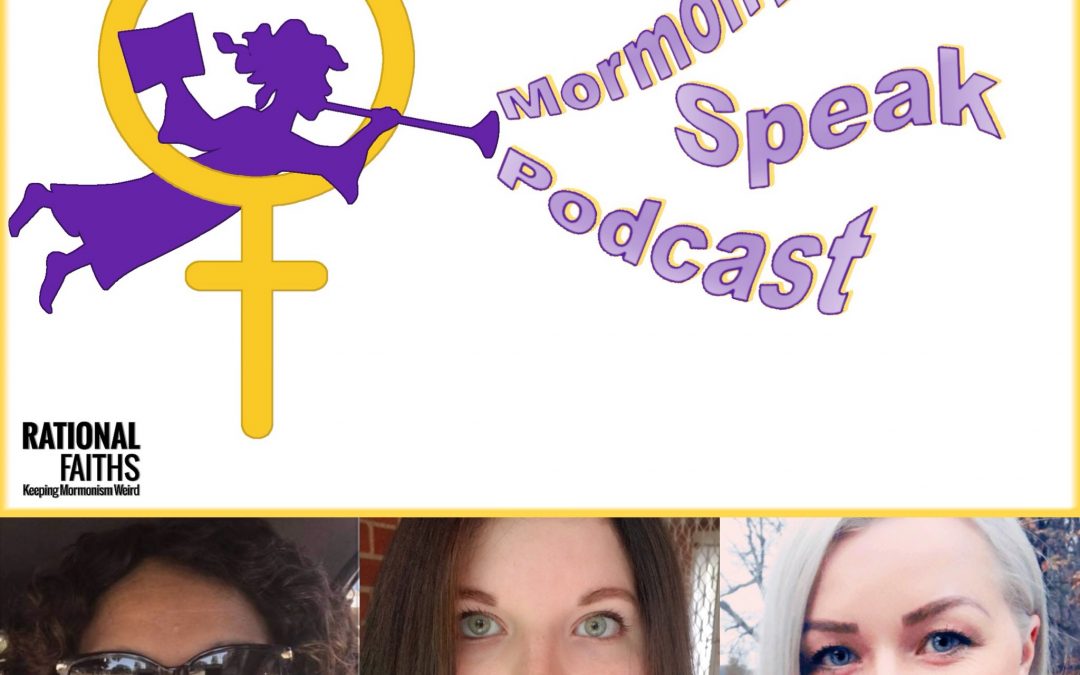Are The Temple Changes Good? Mormon Women Speak (Episode 19, 342)
by Lesley A. Butterfield | Jan 10, 2019 | Activism, Apostasy, Authority, Compassion, covenants, Disagreement, Empowerment, eternal progression, faith crisis, Featured, gender, History, Humanity, LDS Church History, Obedience, Ordain Women, ordinances, Patriarchy, Plural Marriage, Policy, Polygamy, polygamy, Priesthood, Prophets, Racism, Revelation, sexism, spiritual abuse, Temple, Temple Recommend |

Podcast: Play in new window | Download
Subscribe: Apple Podcasts |
Are the recent temple changes good? What has the response been from the Mormon Feminist community? Are apologies necessary for this issue? Is there further marginalization that has occurred because of these changes? How do women of color feel about these temple changes? What do these changes tell us about possible future paths for the church? Does it pave the way for women’s ordination?
Join Miguel and Lesley as they speak with Bryndis and Norienne about their perspectives on the recent changes to the temple ordinances.
***This episode contains a TW for spiritual abuse, temple triggers, and discussion of what some may feel are sacred aspect of their faith.***
LINKS:
LDS Church Changes Temple Ceremony, SL Tribune
Ordain Women
I’m Not Celebrating by Norienne Christensen
A Mind Turned To The Mothers by Tresa Brown Edmunds
Mormons Modify Temple Rites, L.A. Times
Share This Post! Because Sharing Really is Caring!

Lesley holds an RN, BSN from the University of Texas. Lesley has authored several published articles across a variety of platforms and is a frequent media contributor. She functions as a Community Health Nurse for vulnerable populations and serves as a survivor advocate for victims of abuse. She aims to raise awareness of the effects of trauma on individuals and how trauma impacts community systems. Lesley has certifications and training in Trauma-Informed Care, Community Advocacy, Faith and Spiritual Development, Familial Mental Health, Culturally Competent Care, Domestic Violence Awareness, and Resiliency Development. Lesley lives in Virginia with her 4 children and her really hyper chihuahua, named Chaos.
All posts by Lesley A. Butterfield





Please post a written version of the final comment. Last 2-3 minutes. I’d love to share it on my wall. It was excellent.
Just listened again. Last comment starting at last 9 minutes. 1:13:17
Just a quick response (clarification?) to this podcast. The term “New and Everlasting Covenant” is used for various things throughout the D&C. It can be used in the context of: “The new and everlasting covenant of ____ (baptism, marriage, etc.). As far as I understand the entire “new and everlasting covenant” is the fullness of the gospel, with individual covenants (or components of that gospel) also being individual new and everlasting covenants. Just because the words “new and everlasting covenant” are said it doesn’t automatically mean plural marriage, and in the context of marriage specifically talked about in this episode most likely means a marriage sealed by the Holy Spirit of Promise and the priesthood of God (D&C 131). Hopefully this doesn’t come across as preachy, I felt like the worried comments about plural marriage were avoidable and hope that this comment will assist in alleviating those specific fears.
Thanks for another good episode. I find these podcasts helpful in gaining empathy as I feel I can sometimes be naive about the struggles of my fellow members.
https://www.lds.org/scriptures/gs/new-and-everlasting-covenant?lang=eng
The newest changes to the LDS temple ceremony are unprecedented and are a signal of apostasy in the church. In 1990, and prior, there were changes to the wording and removal of portions of the ceremony in the temple. A changing in wording doesn’t always lead to a change in the underlying meaning of the covenant being made. However these most recent changes have changed the covenant. A removal of a covenant is not the same as a change in the covenant. A removal of portions of the ceremony doesn’t necessarily imply that the covenant has changed but rather it was just taken away. However, the covenants that both men and women make in the temple have changed. Women no longer covenant to obey the law of their husbands but rather covenant to obey God directly. If you are not familiar with that wording it may because the wording was changed in 1990 to say the law of the lord. Even with the change in 1990, Eve is addressing Adam when she makes that covenant, not God. She promises to obey Adam and in return she will become Adam’s priestess. Now Eve covenants directly with Elohim to obey him and in return she will be a priestess to him instead of Adam. So which covenant did Eve make in the garden and what were the promised blessings? It can’t be both. This begs the question if these changes are retroactive? Do not say that changing who you covenant with is not an issue. I covenanted with my husband to give myself to him and he covenanted to receive me. If the person in the covenant can change that implies that I can change who I can covenant with regardless of my righteousness because the recent temple covenant changes were changed without regards to the worthiness of a single individual. Also from now on husbands covenant to give themselves to their wives instead of just receive. This sounds like the door for polygamy has been shut. Which would be fine with me but again are these changes retroactive? Also husbands now covenant to preside over their families. This was not in the original covenant. Sigh. Unfortunately the covenants have changed. And I don’t know what this actually means for me or my future daughters that have yet to go through the temple.